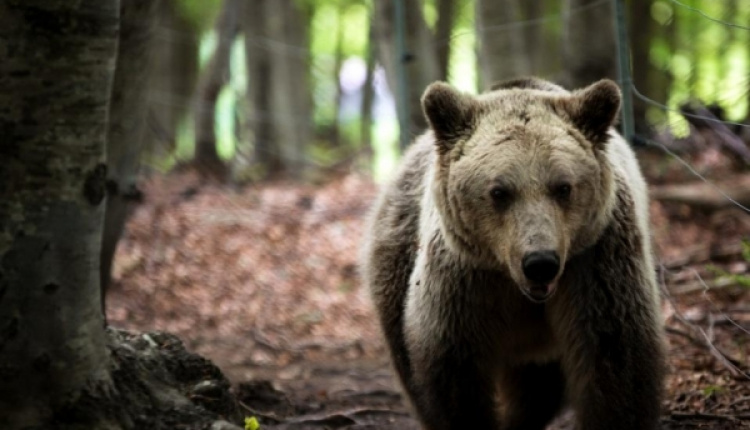Arcturos Offers Sanctuary To Bears That Cannot Go Home
- by XpatAthens
- Monday, 28 September 2015

The calls of great tits, coal tits and chaffinches are the only sounds that break the silence at the Arcturos Sanctuary, in a forest in Nymfaio, Western Macedonia.
Drops from last night’s rain are still dripping from the beech trees as the morning chill turns jackets into valuable allies for the caretakers of the forest’s 12 ursine residents. And now it’s breakfast time.
“We feed the bears in three different locations. Today’s menu includes apples, cherries, peaches and watermelons,” explains 25-year-old Vasilis Fourkiotis, tour guide and Arcturos caretaker with a degree in environmental sociology. Hailing from a family of stock breeders, Fourkiotis already has four years of experience in the field.
“The animals don’t all live together. They are separated so they can coexist in harmony, as they are naturally anti-social creatures,” says Fourkiotis.
“Moreover, in order for us to lessen the chances of the animals suffering anxiety due to the fact that they are to a certain degree confined, we religiously apply international protocol in respect to large predator management, which suggests that we enforce the animal husbandry principle of behavioral enrichment, providing the bears with environmental stimuli for their optimal psychological and physiological well-being,” he adds.
“In other words, we disperse the food all around the area the bears have access to encourage them to be active. Don’t forget that a bear can walk up to 40 kilometers in search of food,” says Fourkiotis.
Having eaten his watermelon, 15-year-old Manolis stands up on both feet and appears to wave. His brother, Kyrgiakos, continues to munch away at his own watermelon a few meters away, indifferent to our presence. When they were cubs, the two brothers were found by a person who took them in as pets. But when they tipped the scales at 250 kilograms and grew to 2 meters in height, they simply became unmanageable. When Arcturos was called in to help, the two bears were completely used to living with people. It would be impossible for them to live in their natural habitat now, which means they will have to live their whole lives in captivity. However, they could do far worse than the Arcturos Sanctuary, an area of some 50 acres offering food, guaranteed care and optimal living conditions.
“We keep the animals here in order to provide them with the best possible living conditions. However, a bear, just like any other wild animal, needs to live and die free in its natural environment,” explains Vangelis Despotakis, Fourkiotis’s co-worker.
“Here at the sanctuary we have three bears from circuses, five from a zoo, three orphans and one blind bear. Unfortunately, it is now impossible for these animals to live freely in nature. They think that humans are their source of food; that’s why they try to get close to us every chance they get. All the animals are neutered given that we do not want more bears living in captivity. In the wild, cubs stay with their mother and learn from her for a period of two to three years. Under the conditions of a shelter, however, this obviously doesn’t happen,” he adds.
The public seems to have a somewhat distorted view of the Arcturos organization’s role. For example, the NGO’s staff often receive calls from animal breeders, demanding that the organization get rid of bears in the mountains.
“The bears are not our property,” says Despotakis. “We exclusively support bears that can’t survive on their own. We do not interfere with those that live freely, nor do we breed bears in order to release them at a later date.”
The situation in regard to how people treat animals has without doubt improved in recent years. However, as a guide, Despotakis believes that his role is not limited to unlocking gates, showing people the animals and providing information.
“I believe that I am here for a purpose. That is to instill in the public a different philosophy on how we treat nature and animals. We should stop feeling sorry for creatures which have have suffered from a position of power. The protection of wildlife, despite its obvious benefits, should serve as a medium through which we can improve human life as well, by reorienting the meaning of animals for humanity. People should not have the kind of relationship with nature that sees them caring for the environment so long as they can benefit from it, and realize that animals and the natural environment have an innate importance to us as human beings,” he says.
To read more, please visit: Ekathimerini
by
Vassiliki Chrysostomidou

